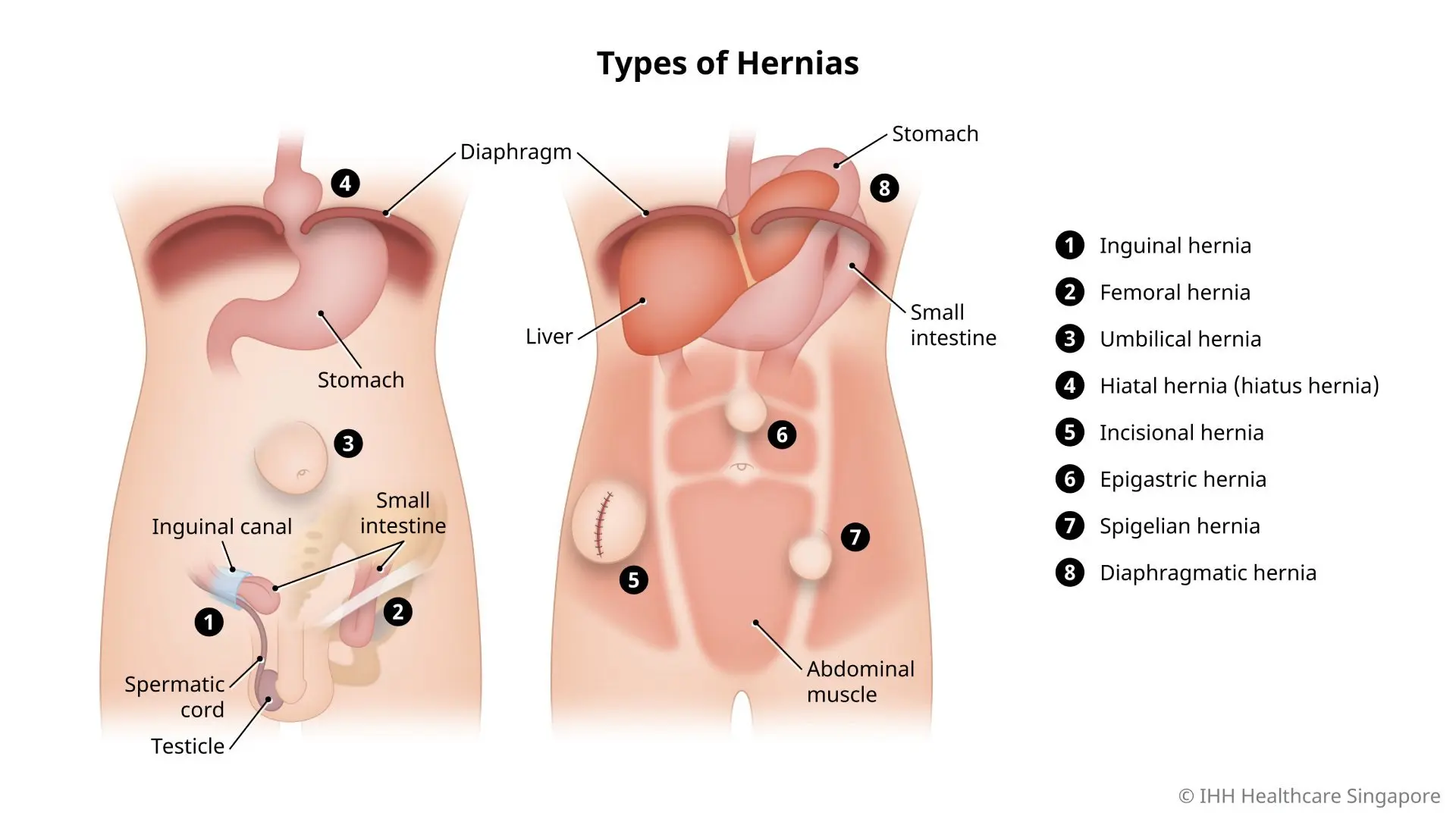What is hernia surgery?

Hernia is a condition in which an internal organ or body part protrudes through the muscle or tissue that normally holds it in place, creating a bulge below the skin.
Most hernias occur in the abdominal area.
How it works
As hernias do not get better on their own, surgery is often the only treatment option.
The type of surgical procedure will vary depending on the location of the hernia.
Your surgeon will make an incision in the abdomen to free up and return the abdominal contents to the abdominal cavity. Next, stitches and nylon meshes will be used to close and reinforce the weakened area of the abdominal muscle.
Minimally invasive laparoscopic (keyhole) surgery is usually carried out to repair inguinal hernias (those at the groin). In this surgical procedure, a laparoscope, which is a flexible and slender instrument, is inserted through a small incision in the lower abdomen. The hernia is repaired from the inside, without the need for a large incision in the abdomen.
Types of hernia
The different types of hernia include:
Inguinal hernia
An inguinal hernia occurs when fatty tissue or a part of the intestine protrudes into the groin at the lower part of the abdomen. It affects men more often than women.
In men, the inguinal canal is a passageway for the spermatic cord and blood vessels leading to the testicles. In women, the inguinal canal contains the round ligament that provides support for the womb.
Femoral hernia
In a femoral hernia, fatty tissue or part of the intestine protrudes into the groin at the top of the inner thigh. It is much less common than inguinal hernias and mainly affects older women.
Umbilical hernia
Umbilical hernia occurs when fatty tissue or part of the intestine pushes through the abdomen at the navel (belly button).
Hiatal hernia (hiatus hernia)
This is when part of the stomach pushes up into the chest cavity through an opening in the diaphragm.
Incisional hernia
After an abdominal or pelvic operation, an incisional hernia may occur when tissue protrudes through the site of the abdominal incision or scar.
Epigastric hernia
In an epigastric hernia, fatty tissue protrudes through the abdominal area between the navel and lower part of the sternum (breastbone).
Spigelian hernia
This occurs when the intestine pushes through the abdomen at the side of the abdominal muscle, below the navel.
Diaphragmatic hernia
In this form of hernia, organs in the abdomen move into the chest through an opening in the diaphragm.
Why do you need hernia surgery?
Hernia surgery may be recommended if the hernia is causing symptoms. For example:
- Pain or discomfort when the hernia protrudes out.
- Tissues (e.g. intestines) becoming incarcerated or trapped in the abdominal wall. This can lead to obstruction of the intestine.
- Strangulation of the hernia, in which blood supply to the protruding tissue has been cut off and the tissue becomes gangrenous. This is a surgical emergency.
Consult your doctor if you suffer from an abnormal lump or a bulge at the groin or abdominal area, or if you suspect you have a hernia.
Your doctor will evaluate your condition and you may be advised to undergo surgery to repair your hernia. The surgery can be performed under general or local anaesthesia, depending on your condition.
- Younger patients who do not suffer from chronic medical conditions, such as diabetes, hypertension or cardiovascular diseases, can undergo day surgery.
- Elderly people and those with more serious health problems may need to be admitted a day before surgery. They may also need to stay a day or two after the procedure for their condition to be monitored.
If left untreated, hernias can worsen and lead to serious complications such as obstruction, strangulation or perforation. A hernia may become irreducible and can lead to severe pain, nausea and vomiting. The condition can be potentially fatal.
What are the risks and complications of hernia surgery?
Having a hernia is a common condition and hernia surgery is considered to be safe.
However, all forms of surgery are associated with potential risks such as infection and blood clots. There is the possibility that the hernia may recur after surgery.
How do you prepare for hernia surgery?
Your doctor may advise tests to ensure you are healthy enough for surgery. This includes checking for any conditions that may make surgery inadvisable.
For 1 week prior to the surgery, you will be asked to stop taking aspirin or other blood-thinning agents.
What can you expect in hernia surgery?
Your doctor will advise on the most suitable surgical option for you, based on:
- The size, type and location of the hernia
- Your health and age
During the procedure
There are 2 types of hernia surgery: open surgery and laparoscopic surgery.
Open surgery
This procedure is performed under general anaesthesia.
Your surgeon will make an incision where the hernia is located. The protruding tissue will be gently pushed back in its proper place.
To prevent the hernia from recurring, the weakened muscle wall is stitched and sometimes reinforced with a mesh for additional support.
Laparoscopic surgery
This procedure is also performed under general anaesthesia. It involves smaller incisions compared to open surgery.
Your surgeon will use a flexible tool called a laparoscope, which has an attached camera. They will insert these surgical tools via the incisions and use the camera view to guide the procedure.
After the procedure
After your discharge and you have returned home, be sure to:
- Practise good hygiene to prevent infection
- Avoid heavy lifting for at least two weeks
Consult your doctor about what activities you can perform safely. Inform your doctor immediately if there are signs of infection or increased pain.
A hernia may recur if:
- You engage in activities that increase intra-abdominal pressure
- You have certain health conditions, such as obesity, chronic cough and constipation
If you take steps to avoid these activities or conditions, you can help to lower the risk of a hernia recurring.
Care and recovery after hernia surgery
Recovery time varies from person to person, depending on the type of hernia and surgical procedure.
You may recover more quickly following laparoscopic surgery and be allowed to return home on the same day.
You may need to stay in the hospital for a few days if additional procedures were required.





